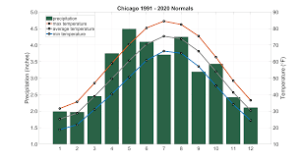Chicago is experiencing one of its most intense heatwaves in several decades. The exact comparison might vary, but temperatures reaching such extreme levels often happen once every 20 to 30 years. Temperatures typically begin to rise significantly after sunrise, usually around 8 to 10 AM.
Chicago is undergoing extreme heatwave, with temperatures expected to surpass those of Monday. The heat index is likely to reach 100°F by noon. An excessive heat warning is in effect for the entire Chicago area until 10 PM tonight.

Residents are advised to stay cool and hydrated, and they can access cooling centers at various public locations, including libraries, schools, and Salvation Army community centers.
According to sources, Chicago has high-pressure systems trapping warm air in the region and increased humidity levels, conditions in Chicago are causing temperatures to soar, with the heat index reaching dangerous levels. This is why the city is under an excessive heat warning today.

At night, Temperatures remain relatively high, especially during a heatwave. The temperature often stays in the 70s or even low 80s Fahrenheit, which can feel uncomfortable due to lingering humidity.
Why this condition is not good for certain group of individuals?
People in Chicago are finding the extreme heat challenging, with many expressing concerns about safety and comfort. Some are worried about the risk of heat-related illnesses, especially for vulnerable populations like the elderly and those without access to air conditioning.
It is impacting human health significantly, leading to conditions such as heat exhaustion, heatstroke, and dehydration. Vulnerable groups, including the elderly, children, and those with former health conditions, are particularly at risk. High temperatures can strain the cardiovascular system, cause dizziness, nausea, and in severe cases, like asthma or other lung conditions.
Measures one can implement to mitigate the effects of extreme heat in Chicago:
- Increase Green Spaces: Plant more trees and create parks to reduce the urban heat island effect.
- Cooling Centers: Expand access to air-conditioned public spaces where people can escape the heat.
- Public Awareness Campaigns: Educate residents about heat risks and prevention strategies.
This news articles is for awareness drive to take precaution especially those who are staying in similar hot countries.
Please like and subscribe my news channel to stay updated on the latest news. Thanks